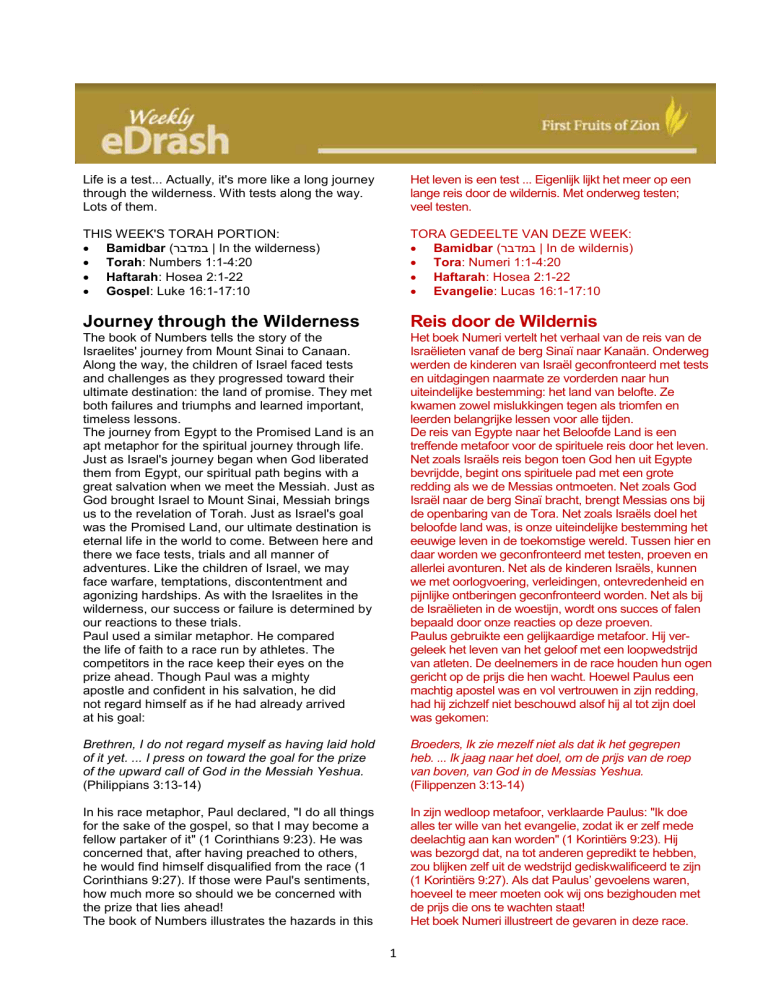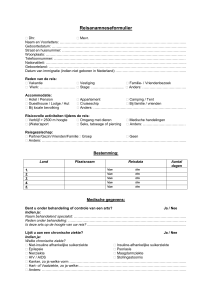
Life is a test... Actually, it's more like a long journey
through the wilderness. With tests along the way.
Lots of them.
Het leven is een test ... Eigenlijk lijkt het meer op een
lange reis door de wildernis. Met onderweg testen;
veel testen.
THIS WEEK'S TORAH PORTION:
Bamidbar ( | במדברIn the wilderness)
Torah: Numbers 1:1-4:20
Haftarah: Hosea 2:1-22
Gospel: Luke 16:1-17:10
TORA GEDEELTE VAN DEZE WEEK:
Bamidbar ( | במדברIn de wildernis)
Tora: Numeri 1:1-4:20
Haftarah: Hosea 2:1-22
Evangelie: Lucas 16:1-17:10
Journey through the Wilderness
Reis door de Wildernis
The book of Numbers tells the story of the
Israelites' journey from Mount Sinai to Canaan.
Along the way, the children of Israel faced tests
and challenges as they progressed toward their
ultimate destination: the land of promise. They met
both failures and triumphs and learned important,
timeless lessons.
The journey from Egypt to the Promised Land is an
apt metaphor for the spiritual journey through life.
Just as Israel's journey began when God liberated
them from Egypt, our spiritual path begins with a
great salvation when we meet the Messiah. Just as
God brought Israel to Mount Sinai, Messiah brings
us to the revelation of Torah. Just as Israel's goal
was the Promised Land, our ultimate destination is
eternal life in the world to come. Between here and
there we face tests, trials and all manner of
adventures. Like the children of Israel, we may
face warfare, temptations, discontentment and
agonizing hardships. As with the Israelites in the
wilderness, our success or failure is determined by
our reactions to these trials.
Paul used a similar metaphor. He compared
the life of faith to a race run by athletes. The
competitors in the race keep their eyes on the
prize ahead. Though Paul was a mighty
apostle and confident in his salvation, he did
not regard himself as if he had already arrived
at his goal:
Het boek Numeri vertelt het verhaal van de reis van de
Israëlieten vanaf de berg Sinaï naar Kanaän. Onderweg
werden de kinderen van Israël geconfronteerd met tests
en uitdagingen naarmate ze vorderden naar hun
uiteindelijke bestemming: het land van belofte. Ze
kwamen zowel mislukkingen tegen als triomfen en
leerden belangrijke lessen voor alle tijden.
De reis van Egypte naar het Beloofde Land is een
treffende metafoor voor de spirituele reis door het leven.
Net zoals Israëls reis begon toen God hen uit Egypte
bevrijdde, begint ons spirituele pad met een grote
redding als we de Messias ontmoeten. Net zoals God
Israël naar de berg Sinaï bracht, brengt Messias ons bij
de openbaring van de Tora. Net zoals Israëls doel het
beloofde land was, is onze uiteindelijke bestemming het
eeuwige leven in de toekomstige wereld. Tussen hier en
daar worden we geconfronteerd met testen, proeven en
allerlei avonturen. Net als de kinderen Israëls, kunnen
we met oorlogvoering, verleidingen, ontevredenheid en
pijnlijke ontberingen geconfronteerd worden. Net als bij
de Israëlieten in de woestijn, wordt ons succes of falen
bepaald door onze reacties op deze proeven.
Paulus gebruikte een gelijkaardige metafoor. Hij vergeleek het leven van het geloof met een loopwedstrijd
van atleten. De deelnemers in de race houden hun ogen
gericht op de prijs die hen wacht. Hoewel Paulus een
machtig apostel was en vol vertrouwen in zijn redding,
had hij zichzelf niet beschouwd alsof hij al tot zijn doel
was gekomen:
Brethren, I do not regard myself as having laid hold
of it yet. ... I press on toward the goal for the prize
of the upward call of God in the Messiah Yeshua.
(Philippians 3:13-14)
Broeders, Ik zie mezelf niet als dat ik het gegrepen
heb. ... Ik jaag naar het doel, om de prijs van de roep
van boven, van God in de Messias Yeshua.
(Filippenzen 3:13-14)
In his race metaphor, Paul declared, "I do all things
for the sake of the gospel, so that I may become a
fellow partaker of it" (1 Corinthians 9:23). He was
concerned that, after having preached to others,
he would find himself disqualified from the race (1
Corinthians 9:27). If those were Paul's sentiments,
how much more so should we be concerned with
the prize that lies ahead!
The book of Numbers illustrates the hazards in this
In zijn wedloop metafoor, verklaarde Paulus: "Ik doe
alles ter wille van het evangelie, zodat ik er zelf mede
deelachtig aan kan worden" (1 Korintiërs 9:23). Hij
was bezorgd dat, na tot anderen gepredikt te hebben,
zou blijken zelf uit de wedstrijd gediskwalificeerd te zijn
(1 Korintiërs 9:27). Als dat Paulus’ gevoelens waren,
hoeveel te meer moeten ook wij ons bezighouden met
de prijs die ons te wachten staat!
Het boek Numeri illustreert de gevaren in deze race.
1
race. The generation of Israelites who left Mount
Sinai never did reach the Promised Land. The
journey through life's spiritual wilderness is fraught
with difficulties and dangers. Paul said, "If anyone
competes as an athlete, he does not win the prize
unless he competes according to the rules" (2
Timothy 2:5). We need to be mindful of the Bible's
rules for this journey. Each day we need to
recommit ourselves to pressing forward and
keeping our eyes on the goal that lies ahead.
This does not mean that if believers fail, God
sends them to damnation. He never sent Israel
back to Egypt. But it does mean that there are
consequences for how we conduct ourselves, and
there is rich reward for those who stay the course.
De generatie Israëlieten die de berg Sinai verliet,
bereikte nooit het Beloofde Land. De reis door de
geestelijke wildernis van het leven is beladen met
moeilijkheden en gevaren. Paulus zei: "Als iemand als
atleet meedingt, wint hij de prijs niet, tenzij hij volgens
de regels meedingt" (2 Timotheüs 2:5). We moeten
rekening houden met de regels van de Bijbel voor
deze reis. Elke dag moeten we onszelf weer opdracht
geven te jagen naar en onze ogen gericht te houden
op het doel dat voor ons ligt.
Dit betekent niet dat als gelovigen falen, God ze naar de
verdoemenis stuurt. Hij stuurde Israël nooit terug naar
Egypte. Maar het betekent wel dat er consequenties
verbonden zijn voor de manier waarop we ons gedragen, en er is een rijke beloning voor degenen die de
wedstrijd blijven lopen.
2












